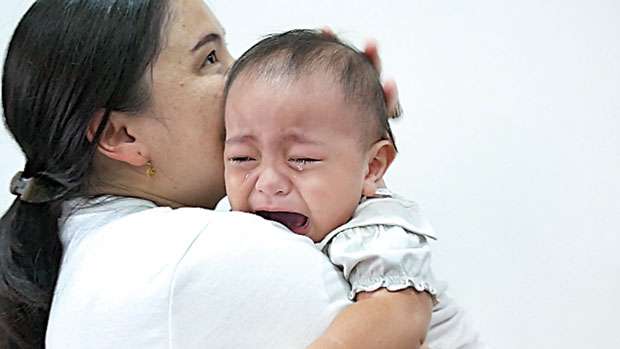04 May 2018 - {{hitsCtrl.values.hits}}

 Crying is one of the key ways a newborn baby communicates with the outside world. A baby cries; to gain the attention of the caregiver when it is hungry and when uncomfortable or when in pain. Interpreting their language can be a frustrating task for new parents. When the crying becomes incessant, the condition can quickly transcend the frustration of an adult to worry, all out of concern for the baby.
Crying is one of the key ways a newborn baby communicates with the outside world. A baby cries; to gain the attention of the caregiver when it is hungry and when uncomfortable or when in pain. Interpreting their language can be a frustrating task for new parents. When the crying becomes incessant, the condition can quickly transcend the frustration of an adult to worry, all out of concern for the baby.
It is approximated that excessive crying is responsible for around 20% of the Paediatric consultations. Is excessive crying something that demands parents to start worrying? If so, why? We consulted Dr. Deepal Perera, Consultant Paediatrician, Apeksha Hospital Maharagama, to discuss in detail about some of the commoner causes for excessive crying by newborns, in this week’s Health Capsule.
Common causes
“In my experience, most of the newborns brought to the clinic due to excessive crying, cry because of hunger”, says Dr. Perera. According to him, the newborn may not be fed adequately because new parents sometimes fail to recognize when the baby is hungry. But, there are also times that the baby is fed frequently enough, but the mother’s milk production is not adequate for the baby’s needs, he further states.

Another common problem is the reflux or regurgitation of milk from the baby’s stomach, making him uncomfortable. A baby’s stomach is not well developed, so milk easily comes back into the upper gastrointestinal tract and then to the mouth and sometimes even through the nose, making the baby cry.
Sometimes, foreign bodies or an upper respiratory tract infection may cause blocking of the nasal passage and make it difficult for them to breath, again causing incessant crying in an infant.
Gastroenteritis or stomach flu, which is one of the commonest infections during infancy, can also cause persistent crying in infants, explains Dr. Perera.
Ear infections are another common ailment among infants and can be the cause for excessive crying. “Even when there is no visible signs of an ear infection, like a discharge of pus from the ears, we may find that the ear is infected, when examining the baby,” states the doctor.
Urine infections can also be suspected, especially when the baby cries while urinating. This can be confirmed through a Urine Full Report and a Urine Culture. Phimosis, or the closure of the urethral opening from birth, can be another cause for persistent crying while urinating, in newborn male infants.
Peri-anal excoriation or irritation around the anal region can also be a cause for excessive crying in a baby, according to Dr. Perera. This condition is usually associated with diarrhea or lactose intolerance, he states.
Persistent crying, when coupled with fever, can be caused by infections. Most of the time the cause will lie in a common and an uncomplicated infection like an infection of the upper respiratory tract, but more rarely, can be due to a more serious cause such as pneumonia or meningitis, explains Dr. Perera.
Newborn babies with birth defects and problems with cognitive development like Cerebral Palsy tend to cry more when compared to other infants, states Dr. Perera. At the same time, he reassures the parents, stressing that these are rarely found cases.
Examining a crying baby
An infant, who cries excessively, when brought to the doctor, will be examined thoroughly after taking into account the baby’s history from the caregiver. All the systems including the baby’s ears, throat, lungs and abdomen are examined. Investigations are recommended if the doctor deemes it necessary. A Full blood count (FBC), Urine Full Report (UFR) and C- Reactive Proteins (CRP) are some of the tests that may be done.
Diagnosis is based on the age of the baby as well as the other signs and symptoms. While the complaints are more common among 0 to 3 months olds’, older infants and toddlers can also present with excessive crying. For an example, teething can be a cause for crying in 4-6 month olds.
Managing the condition
Management of the condition depends on the final diagnosis, explains Dr. Perera. In the case of a bacterial infection like a Urinary or a Respiratory tract infection, the baby may be treated with the appropriate antibiotic. A blocked nasal package may require saline nasal drops or an anti-histamine.
If the baby is deemed underfed, and if the mother does not have adequate breast milk, mother may be given medicine to increase the flow of breast milk.
Advice to parents
According to Dr. Perera, formula feeding is found to be associated with higher risk of excessive crying in infants. Therefore he recommends exclusive breastfeeding until the baby is 6 months old, whenever possible. He also advises parents that the best thing to do if the baby is crying incessantly and is suspected to be ill, is to seek medical advice without delay. “But, it’s also important to remember that sometimes, babies cry without any apparent cause, when it is completely healthy and comfortable, in which case, we, as doctors or parents can do nothing but wait for the bad mood to beat itself”, concludes Dr. Perera.
22 Dec 2024 8 hours ago
22 Dec 2024 8 hours ago
22 Dec 2024 22 Dec 2024
22 Dec 2024 22 Dec 2024
22 Dec 2024 22 Dec 2024